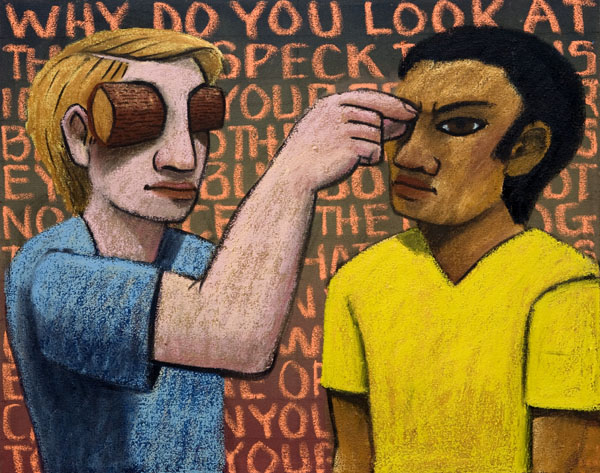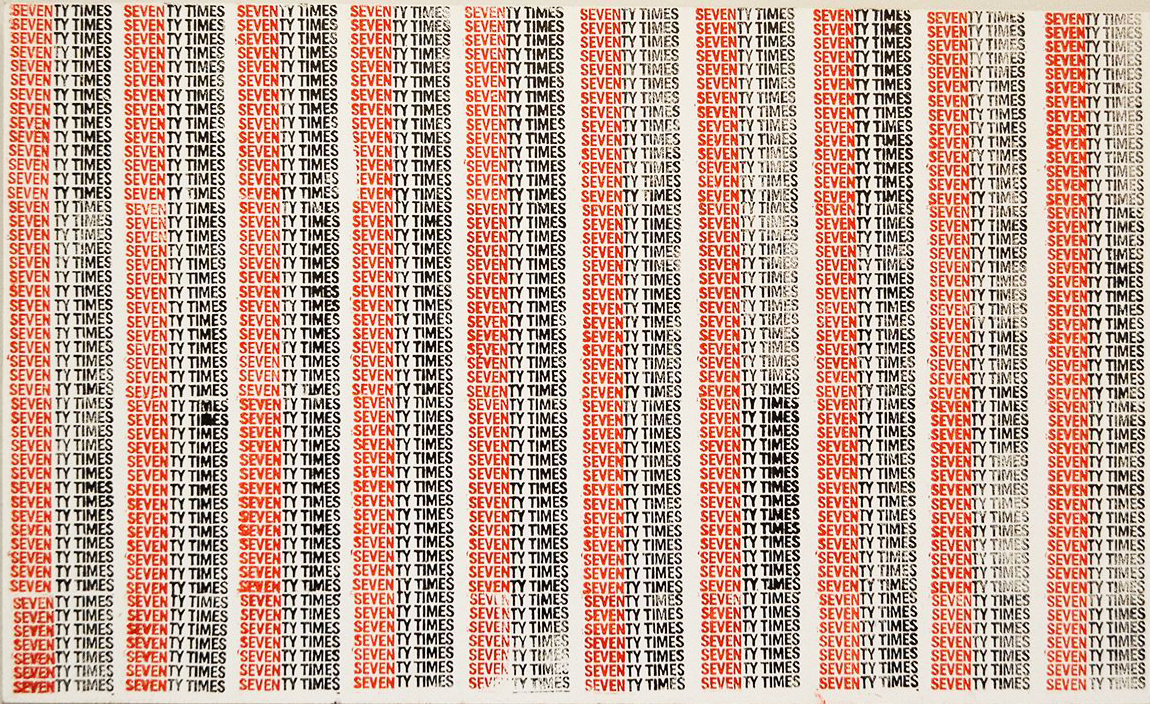March 11: “Do Not Judge—Forgive Others”
♫ Music:
Day 23 - Thursday, March 11
Title: “DO NOT JUDGE—FORGIVE OTHERS”
Scripture: Matthew 7:1-5; 6:9-14
Do not judge so that you will not be judged. For in the way you judge, you will be judged; and by your standard of measure, it will be measured to you. Why do you look at the speck that is in your brother’s eye, but do not notice the log that is in your own eye? Or how can you say to your brother, Let me take the speck out of your eye, and behold, the log is in your own eye? You hypocrite, first take the log out of your own eye, and then you will see clearly to take the speck out of your brother’s eye. Pray, then, in this way: Our Father who is in heaven, Hallowed be Your name. Your kingdom come. Your will be done, On earth as it is in heaven. Give us this day our daily bread. And forgive us our debts, as we also have forgiven our debtors. And do not lead us into temptation, but deliver us from evil. For Yours is the kingdom and the power and the glory forever. Amen. For if you forgive others for their transgressions, your heavenly Father will also forgive you. But if you do not forgive others, then your Father will not forgive your transgressions.
Poetry:
Judge Not
by Margaret Gibson
From inside the house, I hear
over by the woodshed
the steady sound of a maul
as it thinks down
and splits
a chunk of oak, again and again
a muffled
heartbeat sound—
and I get it, how judging one another
works
the analytical split
it makes
how irrevocable the cleaving
and even if the split makes
cordwood
possible
there’s also fire to come, and smoke
a toxic residue
in the air around each word I speak out
or imply in judgment
A suicide may leap free of another’s
judging
and fall into
the mystery of the human heart
But what if it’s common sense
what if it’s clear
what if even a child, or especially a child
would say
Stop!
How to do it, how hold
in balance
what misses the mark
and what hits it
How know without censure
how see the open wound
and the salt already in it
and refuse
to add a pinch more
And there’s this enigma—
the heart
seems to need to be split
by error
even shattered
I’m only human
one may say, and I might say that, too
We might stand in a human chorus
and mutter it, over and over
But how put a stop to what harms
how make whole
how raise the maul and bring it down
and make
a break so clean one can
(reaching beyond what can or can’t
be known)
touch what is.
"Judge Not," was published by Image Journal and is included in Margaret Gibson's new book of poems, The Glass Globe, which will be published by LSU Press in August, 2021
DO NOT JUDGE--FORGIVE OTHERS
It is unsurprising that Jesus, a craftsman, would weave woodworking into his teaching.
Raised in a family trade, Jesus has spent years refining his artist’s eye. When Jesus holds a piece of cedar, he sees more than an inert log. He reads the grain like a conductor scans a score, seeing what is and what is possible. Under Jesus’ eye, the wood is not neutral. This material has grown in unique conditions with a unique history. To be formed into a work of art, the craftsman must work according to the pattern of the wood. The texture and warp must be taken into consideration, a constructive dialogue between artist and material. Creating a beautiful object is a patient process, where making is not forced but followed.
Because Jesus’ gaze is perfect, Jesus can see the unique contours of the wood he works with. Jesus knows the precise place to make the cut, so his eyes are not flecked with dust. He works with patience and precision, because his eyes are clear, and his hands are skilled.
“Do not judge,” Jesus says. Which is another way of saying, “you cannot see the whole.” You are unskilled in seeing the texture and grain. You make wild strokes with the saw because you are impatient and unpracticed. Like an overeager apprentice, you make more mess than art, sending dust flying in every direction.
And yet, we do it. Again and again, we send the sawdust soaring. And over the years these specks that lodge in our eyes accumulate. The speck becomes a stick, the stick becomes a log. The longer we go, the less we realize that our eyes are mopping up the mess. We make worse cuts with less precision, because our eyes haven’t been cleaned and cleared.
“Do not judge,” Jesus says, because you are incapacitated. It’s not safe for you to handle these tools or the delicate eye of your brother, your fellow apprentice. Your brother’s eye is too fragile and too precious for you to handle with clumsy hands. Your good intent does not make you skillful. And don’t blame your sister for the mess you helped make. You can’t clean up without making a worse mess, because you don’t have the patience, the sight, or the dexterity.
“Instead,” Jesus says, “pray this way.” Implore our Father, the one who can give sight to the blind. The one who can make weak hands strong. Daily, ask to be forgiven. And daily, be met with forgiveness.
When we step into the world of Jesus’ prayer, we step into a world where forgiveness becomes the very air we breathe. Like Forte’s visual parable of Jesus’ teaching, forgiveness ceases to be something that we count on a case by case basis. In the painting, the eye begins to blur the words “seventy times,” until a new pattern emerges. The painting and the parable suggest that the amount of forgiveness isn’t the point. By entering into prayer, our gaze can grow larger even as God washes our eyes, healing our sight.
In this world graced by forgiveness, our eyes can be made well. We do well to humble ourselves, to sit down together as we ask our Father for help. We patiently wait for the Lord to restore our sight, admitting that we are not capable of seeing or helping our siblings in our blinded state. And as the Lord touches our eyes, restoring our sight, Jesus asks more. He asks us not to see the speck, but to lock eyes. With healed eyes you will no longer see obstacle or enemy. Instead, you will see the face of your brother, the iris of your sister, God’s image gazing back at you.
Prayer:
Lord, open up my eyes
To see the ties that bind
All of humankind.
In humility, help me to sit,
Not to take healing into my own hands
But to trust that you will set my gaze
On the eyes of my sister, my brother, my friend
Chad Glazener
Pastor of First Covenant Church
Portland, Oregon
For more information about the artwork, music, and poetry selected for this day, we have provided resources under the “About” tab located next to the “Devotional” tab.
About the Artwork #1:
Take the Log Out First
Wayne Forte
2010
Oil and acrylic on canvas
24" x 30”
About the Artist #1:
Wayne Forte (b. 1950) was born in Manila, Philippines, and studied at the University of California at Santa Barbara (B.A.,1973) and University of California at Irvine (M.F.A., 1976). Forte lives with his wife in Laguna Niguel, California. He has been a member of CIVA (Christians in the Visual Arts) for fifteen years and participated in the Florence Portfolio Project in 1993. He has also taught courses at Biola University and Gordon College, Orvieto Campus, Italy. Forte was educated to paint in the self-referential Modernist tradition but longed for the passion of an earlier age—a passion for the spiritual and the transcendent found in the biblical narrative paintings of Gruenwald, Rubens, Rembrandt, and Caravaggio. His goal is to create paintings with powerful messages about faith that can resonate with contemporary viewers.
https://wayneforte.com/picture/take-the-log-out-first/
About the Artwork #2:
Seventy Times
Jacob Adent
2015
Print on paper
96" x 24”
About the Artist #2:
Jacob Adent is a graduate of Biola’s art department. Currently located in the Czech Republic, Jacob and his wife, Denny, are both serving with Josiah Venture, an international ministry that seeks to empower the youth of Central and Eastern Europe. Jacob is a graphic designer on the JV Communications Team, and Denny serves the executive team as an administrative assistant. Their discipleship of young people through the local church inspires them to serve the international effort of missionaries and local churches across this region. Whether coordinating training events and empowerment or creating media that help share the gospel in over sixteen countries, they are dedicated to pursuing God’s call on their life.
https://www.josiahventure.com/people-and-places/czech-republic/23524
About the Music:
“Brother” from the album Brother
Lyrics:
When I look into the face of my enemy
I see my brother, I see my brother
When I look into the face of my enemy
I see my brother, I see my brother
Forgiveness is the garment of our courage
The power to make the peace we long to know
Open up our eyes
To see the wounds that bind all of humankind
May our shattered hearts
Greet the dawn of life with charity and love
About the Composers/Lyricists/Performers:
The Brilliance is a contemporary classical music duo composed of David Gungor and John Arndt. They are one of an emerging new breed of Christian artists who are taking our nature as “storied” creatures seriously and putting forward a sort of “new liturgy” which both honors the past and points the way forward into the future. Their music explores the essence of who we are as God’s creation and as His reflection. Taking their musicality to new heights, blending strings, keys, percussion, and voice, along with poetry and prayer, The Brilliance appeals to diverse audiences—across generations, denominations, and cultures.
http://thebrilliancemusic.com/
About the Poet:
Margaret Gibson, current State of Connecticut Poet Laureate, is the author of twelve books of poems, all from LSU Press, most recently Not Hearing the Wood Thrush (2018). Her new book, The Glass Globe, is forthcoming in 2021. Her many accolades include: the Lamont Selection for Long Walks in the Afternoon (1982); the Melville Kane Award (co-winner) for Memories of the Future (1986); and the Connecticut Book Award for One Body (2008). The Vigil was a finalist for the National Book Award in Poetry in 1993. Broken Cup was a finalist for the 2016 Poets’ Prize, and the title poem from the book won a Pushcart Prize for that year. Her poem entitled “Passage,” from Not Hearing the Wood Thrush, was included in The Best American Poetry, 2017. She has written a memoir: The Prodigal Daughter, University of Missouri Press, 2008. Gibson is Professor Emerita, University of Connecticut. As Connecticut State Poet Laureate (2019 –2022), Margaret Gibson has been awarded an Academy of American Poets Grant for Poet Laureates. As Poet Laureate, Gibson has taken as her social focus “Poetry and the Environment during Climate Crisis” and is funding videos of Connecticut poets reading their poems about the environment in natural settings. An anthology of CT poets writing about the climate crisis, Waking Up To The Earth, will be published in April 2021. Gibson lives in Preston, CT.
www.margaretgibsonpoetry.com
About the Devotion Author:
Chad Glazener
Pastor of First Covenant Church
Portland, Oregon
Chad Glazener, an alumnus of Biola and the Torrey Honors College, is a pastor and writer. He currently serves as lead pastor of First Covenant Church in Portland, Oregon. He is a beloved son of God, Rachel’s husband, and Maddie, Lucy, and Henri’s dad.

